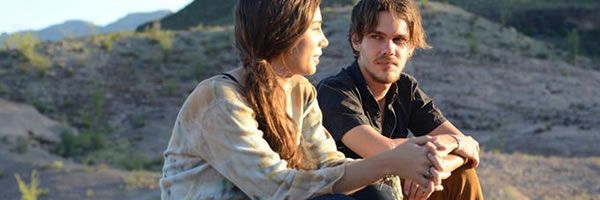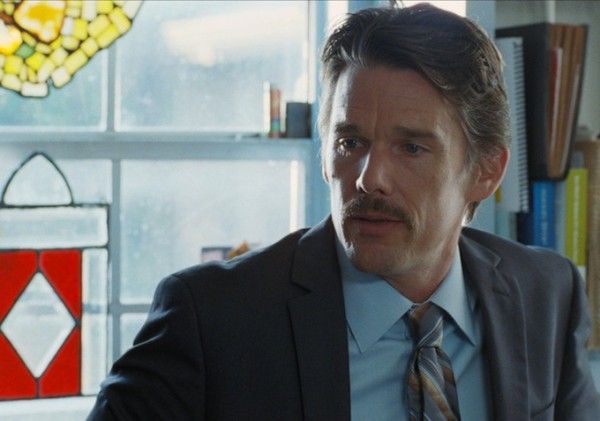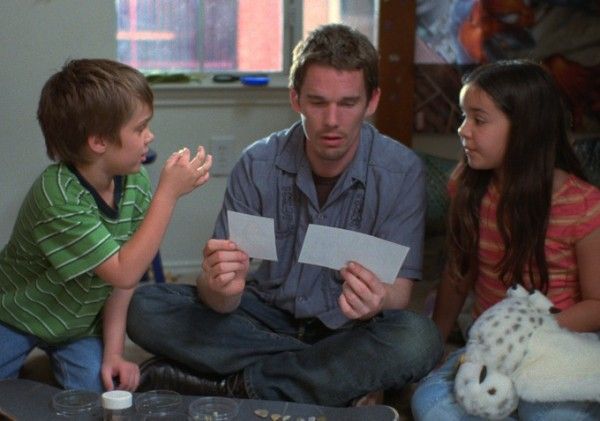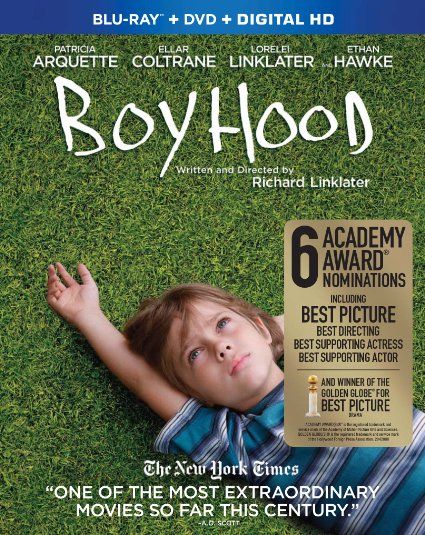Richard Linklater has developed into a major artist, but his greatness was hiding in plain sight. It was hard to know what to make at first as many of his early efforts (outside of Dazed and Confused) were didactic, and maybe a little too pretentious, and then there was a period where he seemed lost and possibly ready to cash in (like The Bad News Bears remake). And yet the last two years have brought Before Midnight and Boyhood, two films that deal with the passage of time in ways that seem rare to cinema, and offer new ideas on how to tell a narrative. After this year it’s inarguable: Linklater is a major filmmaker, and one of the great American directors. In Boyhood, Ellar Coltrane ages from six to eighteen in the film as his parents (played by Patricia Arquette and Ethan Hawke) watch on. My review of the Blu-ray follows after the jump.
The film begins with Mason (Coltrane) and Samantha (Lorelei Linklater, the director’s daughter) being forced to move, as their divorced mother (Arquette) wants to go back to school to provide more for her family, especially since their dad (Hawke) isn’t around. Once they move they do see more of their father, and he’s an overgrown child who drives around in a Camaro. Eventually the mother remarries, but the new husband is controlling and has a drinking problem. Though the film is about the passage of time, the jumping ahead is never called attention to, though it is noticeable due to environment and hairstyle changes. As Mason enters the teen years, he finds his way to partying and girls, while the mom eventually finishes her schooling and moves on to another man who proves to have similar aggressive tendencies. Mason’s dad has found a new wife, has another child and eventually sells the Camaro for a minivan. And as Mason goes through his first big relationship, he’s ready to start his life, even though it hurts his mom.
Considering President Barack Obama has declared Boyhood the best film of 2014, and the awards drum is building for the movie, perhaps it’s best to discuss the film’s possible negatives. Ellar Coltrane’s character spends much of the film as a cypher until the teenage years, which are most notable for the speeches adult men give him, and then his turn towards the pretentious as he wants to be a photographer and has conversations with his girlfriend that have the air of someone who’s read just enough philosophy to be tedious. But I don’t think this works against the film. Mason is on his way to finding out who he is, and though the rejection of certain technologies as a plot point may come directly from the performer or from Linklater’s past, the film feels true, and also fitting for this era. No one is about to go off to war, and it feels like people don’t become fully-formed adults until much later in life these days. Mason is still finding his way, and the end of the film suggests he’s on that road, but that he isn’t all the way there isn’t a knock against the film. You could probably also nit-pick the movie a little (there’s some rough ADR patches, at one point Arquette appears to be pregnant, etc.), but that’s the least interesting sort cinema criticism.
But the negatives are unimportant compared to what the film does accomplish, what’s great about the movie is how it reflects the growth of the parents into practical adults (the film was originally titled 12 Years, but that title was nixed when a certain film won best picture). When introduced to Hawke’s character, we see someone who wasn’t ready to be a father and isn’t entirely comfortable with playing weekend dad, but has embraced it just the same. He enters the movie hoping to reconcile with his wife (though perhaps just for an evening), while Arquette’s character has more of a head on her shoulders, though that may have more to do with being saddled with children. And what’s great to see is how Linklater reveals her choices in men throughout. The first guy might be a little angry, but then she starts dating a professor who seems to be totally unlike the previous two relationships. And yet by the time she moves on to the next guy, the audience can see a pattern, perhaps something she finally recognizes about herself.
That also builds to one of the most shocking/controversial passages in the film as one marriage turns abusive, something well set up in the film, which (at least as a west coast, big city person) felt a little retro/out of place. Linklater said he borrowed from his life, and it’s likely that he’s reflecting something that happened in his family in the seventies. That said, it’s not like domestic abuse has gone away, so it’s fascinating to see it portrayed on screen. This also points out that it helps to retain a certain critical distance from the events. Everyone begins experimenting with drugs and sex at different times in their lives, so the film is rarely going to synch up to personal experiences. As someone who grew up in the northwest, I didn’t have a lot of fatherly figures who gave inspiring speeches about how I was possibly wasting my potential, but that doesn’t mean they don’t happen (though they may happen more in Texas - who can be sure?)
But Linklater’s control of time - how he got all the pieces together - is so dazzling. This could be typed a gimmick movie, but the director has found a new way to tell a story and in a way that’s inherently cinematic, but perhaps cost prohibitive. We’ve seen the passage of time reflected in sequels (specifically the Harry Potter films, but also Francois Truffaut’s Antoine Doniel series and Linklater’s own Before movies), and in documentaries like Michael Apted’s Up films, but never as a single experience, and this is singular. There’s nothing like it. That’s not a good reason to name a film the best of the year, though, and it wouldn’t mean anything if the performances weren’t great and there wasn’t a powerful sense of humanity to the work. Boyhood is a special film, the sort that comes over an audience in waves that has a lasting, haunting power. It’s a masterpiece.
Paramount’s Blu-ray of the film comes with a DVD and digital copy, and is presented in widescreen (1.78:1) and in DTS-HD 5.1 Master Audio. Though the film was shot over twelve years on film, the picture quality is consistent throughout and the film looks and sounds wonderful. Supplements are limited, which may have something to do with a future special edition, though it’s possible that Linklater, etc. have no interest in doing a commentary track. There are two featurettes: “The 12 Year Project” (19 min.), which is fascinating because it has interviews conducted throughout the filmmaking process in this all too short making of, and then a Cinefamily “Q&A with Richard Linklater and the Cast” (53 min.) which features leads Coltrane, Lorelei Linklater, Hawke and Arquette, and it’s a good open discussion about the making of the movie, which emphasizes that Linklater had a plan all along, though one would love to get into the nuts and bolts of how many days a year, and what time of the year, that sort of thing, just because it’s so fascinating in the case of this movie. Hopefully we’ll eventually get a more special edition.




